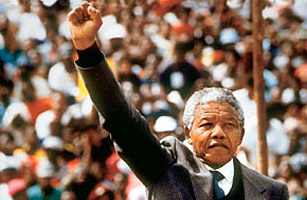
Mandela salutes supporters at the Soweto soccer stadium.
Feb. 11, 1990
When the slender, white-haired Nelson Mandela, then 71, first glimpsed the crowd assembled at the gates of Victor Verster prison, he instinctively raised his right arm in the black-power salute of a clenched fist — a simple public gesture that he had not been able to make during his 27 years, six months and seven days of imprisonment. His release had been orchestrated by South Africa's white minority government, but it was a reluctant acknowledgement of what had become an unstoppable force. The world had lost patience with white rule in South Africa and had placed its faith in a man whom no one had seen in decades. That Mandela seemed not only unbowed but undamaged, and preached reconciliation rather than revenge, won over all but the staunchest defenders of the the country's system of racial oppression known as apartheid. Later that afternoon, on the day of his own walk to freedom, he told the enormous crowd assembled at the Grand Parade square in Cape Town, "Our march to freedom is irreversible." The man who would become President four years later had never doubted it during what he called his "long, lonely, wasted years" in prison. It had just taken a lot longer than he had expected.